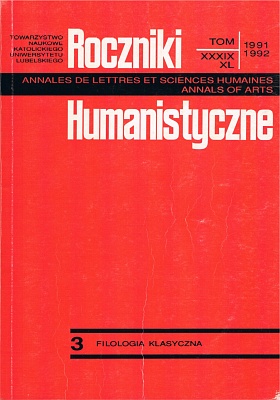Ibis Owidiusza − analiza literacka poematu
Abstrakt
The poem, written in exile, is among Ovid’s less well-known works. Following, as indicated by the writer himself, the literary tradition of invective pieces in the style of Archilochus and a lost poem of the same title by Callimachus, Ibis comprises several hundred verses of mythological malediction against the poet’s enemy in Rome. The piece, composed into a brace structure in accordance with the rules of rhetoric, consists of several distinct thematic units. The largest part (more than half of the poem) contains sequences of curses linked only by mental association. Ovid makes ample use of rhetorical devices. As in his earlier works, also in Ibis he plays with words, constructing ever more complex variations. The poem, different as it is from Ovid’s all other output, is an intriguing piece of writing. It is possible to read it as a parody an uncommon form of consolation in disguise.
Copyright (c) 1992 Roczniki Humanistyczne

Utwór dostępny jest na licencji Creative Commons Uznanie autorstwa – Użycie niekomercyjne – Bez utworów zależnych 4.0 Międzynarodowe.





